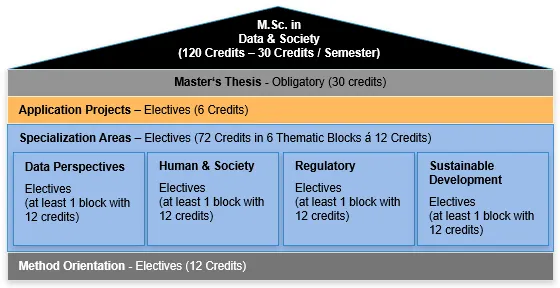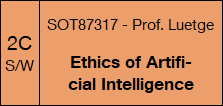Data & Society
New M.Sc. Program • Plug-In Modules • Certificates
Summary
- Engineering education of the future: “Transfer of scientific findings into societal value creation will take place across disciplines”.
- TUM as a hub for Human Centered Engineering.
- Additional „21st Century Skills“-offer for TUM students.
- Solution-oriented interdisciplinary tackling of the "grand societal challenges“.
- Characterized by a positive vision of the future.
-
Levels of data and technology-oriented applications: Human + Society + Planet.
M.Sc. Data & Society - Overview
The “Data & Society” degree program is exclusively for students with a STEM Bachelor degree who have an interest in social contexts at the interface of technologies with people and society and offers students the opportunity to create added value for society by applying technical skills with a view to social needs and sustainable processes. This exciting program is designed to equip you with the skills and knowledge necessary to navigate and influence the rapidly evolving engineering landscape.

The program is flexible and stackable. At least 90 credits must be earned in elective modules. Of these, at least 12 credits must be earned in the elective area of "Method Orientation", at least 72 credits in the elective area of areas of "Specialization" and at least 6 credits in the elective area of "Application Project". In the elective area of specialization, elective modules from a total of six thematically related module blocks of 12 credits each must be completed, whereby at least one thematically related module block of at least 12 credits must be completed from each of the four specialization areas "Data Perspectives", "Human & Society", "Regulatory" and "Sustainable Development".
Specialization Areas - Thematic Blocks - Modules
The specialization courses in the Teaching Area "Data & Society" are organized in thematic blocks of 12 credits. You are free to take any course in the program as plug-in module for any TUM study program. However, if you are studying the M.Sc. "Data & Society" or your goal is to receive a certificate (see below), you have to take thematic block of (normally two) modules.
Some of the courses are already starting in the Summer Semester 2024 (S) and the Winter Semester 2024/25 (W). All course will start with the start of the M.Sc. Data & Society in the Summer Semester 2025.

|

|

|

|
|---|---|---|---|
 
|
 
|
 
|
 
|
 
|
 
|
 
|
 
|
 
|
  
|
 
|
 
|
 
|
 
|
 
|
 
|
Certificates
A certificate can be obtained in each of the four specialization areas "Data Perspectives", "Human & Society", "Regulatory" and "Sustainable Development". A certificate for the respective area of specialization is awarded for proof of modules totaling at least 24 credits from completed thematical module blocks (12 credits each). Certificates are primarily intended for students who complete several modules in the areas of specialization without being enrolled in the Master's program "Data & Society". Certification is granted upon request to the Examination Board.
Application to the M.Sc. Program
Applicants to the Master's program in Data & Society at the Technical University of Munich must hold a completed Bachelor's degree. Additionally, they need to complete the following steps:
- Motivation Letter: Submit a written motivation letter of up to 150 words explaining why you have chosen the Data & Society program at TUM. Highlight your fit for the program and provide examples, such as relevant internships, study-abroad experiences, or any professional or academic training demonstrating your qualifications for this field.
- Interview: Selected applicants will be invited to an interview. The interview will last between 20 and 30 minutes in English. It will cover your motivation for applying, your academic background in MINT (STEM) fields, and your ability to work scientifically and methodically. You will also be asked about your understanding of societal dynamics and global developments concerning technological innovations.
All information related to application and admission can be found here.
Offered Modules
Data Perspectives
The focus of this elective area is on the critical examination of data and algorithms in the context of people and society. The modules in this elective area deal with the bias and fairness of data and algorithms as well as their societal implications and effects on fundamental rights. Other topics include the governance and availability of data.
MASCHINE LEARNING AND SOCIETY
Prof. Dr. Orestis Papakyriakopoulos (Societal Computing)
Summer Semester • 3 ECTS: SOT86066 • 6 ECTS: SOT86065
SOCIETAL COMPUTING
Prof. Dr. Jana Diesner (Human-Centered Computing)
Summer Semester • 6 ECTS: SOT86068
ALIGNING GENERATIVE AI TO SOCIAL VALUES
Prof. Dr. Orestis Papakyriakopoulos (Societal Computing)
Winter Semester • 3 ECTS: SOT86097 • 6 ECTS: SOT86074
DATA ETHICS AND GOVERNANCE
Prof. Dr. Sabina Leonelli (Philosophy and History of Science and Technology)
Summer Semester • 6 ECTS: SOT46401
OPEN DATA - OPEN SCIENCE
Prof. Dr. Sabina Leonelli (Philosophy and History of Science and Technology)
Winter Semester • 3 ECTS: SOT53406 • 6 ECTS: SOT86076
ALGORITHMS & FUNDAMENTAL RIGHTS
Prof. Dr. Jürgen Pfeffer (Computational Social Science)
Summer Semester • 6 ECTS: SOT86075
Human & Society
This elective area contains modules that aim to introduce STEM-focused students to the fundamentals of human behavior and social issues. These include the historical and current interplay between humans and technology, their philosophical and ethical dimensions, as well as topics in the context of conflict and crises.
INTRODUCTION TO PSYCHOLOGY AND HUMAN BEHAVIOR
Prof. Dr. Doris Holzberger (Psychology of Teaching and Learning)
Summer Semester • 3 ECTS: SOT10069 • 6 ECTS: SOT10078
PSYCHOLOGY OF LEARNING AND INSTRUCTIONAL DESIGN OF AI-BASED SYSTEMS
Prof. Dr. Tina Seidel (Educational Psychology)
Winter Semester • 6 ECTS: SOT10057
SOCIETY AND TECHNOLOGY
Prof. Dr. Beck (Sociology of Science and Technology) and Prof. Dr. Niewöhner (Anthropology of Science & Technology)
Summer Semester • 6 ECTS: SOT46402
ETHICS IN ARTIFICIAL INTELLIGENCE
Prof. Dr. Christoph Lütge (Business Ethics)
Summer Semester • 3 ECTS: SOT87317
RESPONSIBILITY IN THE ENGINEERING PROFESSION. APPLIED ETHICS FOR ENGINEERS
Dr. Jörg Wenecke (Philosophy of Science)
Winter Semester • 3 ECTS: SOT53200
PHILOSOPHY OF ARTIFICIAL INTELLIGENCE: KEY READINGS
Prof. Dr. Stefania Centrone (Philosophy of Science)
Summer Semester • 6 ECTS: SOT56307
APPLIED PHILOSOPHY OF QUANTUM THEORY
Prof. Dr. Stefania Centrone (Philosophy of Science)
Summer Semester • 6 ECTS: SOT56401
INFORMATION TECHNOLOGIES, PROTEST, AND CONFLICT
Prof. Dr. Katrin Paula (Global Security and Technology)
Winter Semester • 6 ECTS: POL60900
RISK & CRISIS COMMUNICATION
Dr. Stefanie Walter (Media Portrayal of Majority and Minority Group)
Winter Semester • 3 ECTS: SOT86102• 6 ECTS: SOT86080
Regulatory
This elective area includes modules from the fields of law and politics at the interface with technology. The focus here will be on the regulation and governance of technologies, data and AI at national, EU and global level.
DATA REGULATION & LAW
Prof. Dr. Boris Paal (Law and Regulation of the Digital Transformation)
Winter Semester/Summer Semester • 3 ECTS: SOT86060 • 6 ECTS: SOT86061
AI REGULATION & LAW
Prof. Dr. Boris Paal (Law and Regulation of the Digital Transformation)
Summer Semester • 3 ECTS: SOT86062 • 6 ECTS: SOT86063
POLITICS FOR ROCKET SCIENTISTS:
AN INTRODUCTION TO POLITICAL SCIENCE FOR NON-POLITICAL SCIENTISTS
Prof. Dr. Tim Büthe (International Relations)
Summer Semester • 6 ECTS: POL00011
FUNDAMENTALS OF COMPARATIVE POLITICS
Prof. Dr. Yannis Theocharis (Digital Governance)
Winter Semester • 6 ECTS: POL10500
START-UP SKILLS - LEGAL FUNDAMENTALS
Prof. Dr. Boris Paal (Law and Regulation of the Digital Transformation)
Winter Semester • 6 ECTS: SOT86083
INTRODUCTION TO BUSINESS LAW
Prof. Dr. Boris Paal (Law and Regulation of the Digital Transformation)
Winter Semester • 6 ECTS: SOT86084
GLOBAL GOVERNANCE OF AI
Prof. Dr. Urs Gasser (Public Policy, Governance and Innovative Technology)
Summer Semester • 6 ECTS: SOT86082
Sustainable Development
In the Sustainable Development elective area, the focus is on the global development of the planet. The individual modules focus on sustainable technologies on the one hand and on local (public interest) and international (global development) issues on the other.
CLIMATE FINANCE
Prof. Dr. Florian Egli (Public Policy for the Green Transition)
Summer Semester • 6 ECTS: SOT86067
SUSTAINABLE TRANSITIONS
Prof. Dr. Florian Egli (Public Policy for the Green Transition)
Winter Semester • 6 ECTS: SOT86085
SUSTAINABILITY POLITICS AND POLICY
Prof. Dr. Miranda Schreuers (Environmental and Climate Policy) & Prof. Dr. Stefan Wurster (Policy Analysis)
Winter Semester • 6 ECTS: SOT86611
TECHNOLOGY AND DEVELOPMENT
Dr. Laura Mahrenbach (Comuptational Social Science)
Winter Semester • 6 ECTS: POL60402
TECHNOLOGY AND THE PUBLIC INTEREST
Prof. Dr. Urs Gasser (Public Policy, Governance and Innovative Technology)
Winter Semester • 6 ECTS: SOT86087
INTRODUCTION TO GLOBAL HEALTH
Prof. Dr. Janina Steinert (Global Health)
Summer Semester • 3 ECTS: SOT82106
GENDER DISPARITIES IN HEALTH AND DEVELOPMENT
Prof. Dr. Janina Steinert (Global Health)
Summer Semester • 3 ECTS: SOT82107
Method Orientation
In this area, we enable students from a wide range of B.Sc. backgrounds to expand their methodological knowledge. Since most STEM B.Sc. degree program have a sound mathematical and method-oriented education, students will also learn how to apply this knowledge to study social and societal challenges.
ADVANCED METHODS FOR MEASUREMENT AND MODELING OF CHOICE BEHAVIOR
Prof. Dr. Allister Loder (Mobiliy Policy)
Winter Semester • 6 ECTS: SOT86608
ANALYZING TEXT DATA: FROM BASICS TO ADVANCED TECHNIQUES
Prof. Dr. Jürgen Pfeffer (Computational Social Science)
Summer Semester • 6 ECTS: SOT86069
PROGRAMMING FOR NON-COMPUTER SCIENTISTS
Prof. Dr. Jürgen Pfeffer (Computational Social Science)
Summer Semester • 6 ECTS (POL20100)
ADVANCED COMPUTATIONAL METHODS
Prof. Dr. Jürgen Pfeffer (Computational Social Science)
Winter Semester • 6 ECTS: SOT86050
METHODS OF SOCIAL NETWORK ANALYSIS
Prof. Dr. Jürgen Pfeffer (Computational Social Science)
Winter Semester • 6 ECTS: SOT86055
QUALITATIVE METHODS
Prof. Dr. Eugénia da Conceição-Heldt (European and Global Governance)
Winter Semester • 6 ECTS: SOT86402
Application Project
The practical modules focus on the ability to develop interface skills between technology and society. Students apply a combination of technical and social knowledge in project collaborations with private companies, public administration and national and international institutions.
APPLICATION PROJECT: PUBLIC SECTOR
Prof. Dr. Jürgen Pfeffer (Computational Social Science)
Winter Semester • 6 ECTS: SOT86072
Contact
For all questions realted to individual classes, please contact the respective lecturerer. For all questions related to the M.Sc. Data & Society or the Certificates, please reach out to: ds(at)sot.tum.de.